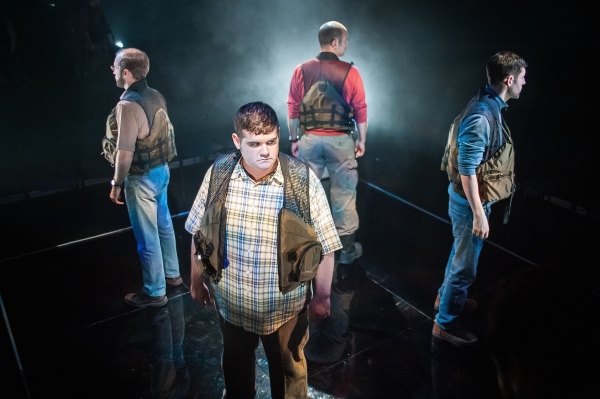Deliverance

(© Jason Woodruff)
James Dickey's Deliverance, a brutal tale of survival, murder, and ethical dilemmas, takes place on a raging river in the vast landscape of the Georgia Appalachians. It's an enormous setting that the 1972 film version, starring Jon Voight and Burt Reynolds, was able to capture. Godlight Theatre Company has gone in a different direction with a smart, insightful production at 59E59 Theaters by channeling the book's vast natural backdrop and big themes onto a small stage and focusing on the interior journeys of its characters.
That challenge might seem as daunting as braving the rapids, but director Joe Tantalo and his excellent cast and crew have succeeded in adapting the novel — not the movie — for the stage. Don't come expecting to hear "Dueling Banjos," but do come to see a theatrically inventive retelling that's true to the original story.
Burnt-out suburban ad man Ed Gentry (Nick Paglino) agrees to join his survivalist buddy Lewis (Gregory Konow) on a canoe trip down a raging river in the Georgia mountains. Alpha male Lewis, convinced that society is teetering on the brink of collapse, also persuades level-headed Drew (Sean Tant) and tractable Bobby (Jarrod Zayas) to come along for the weekend trip and rough it in the wild outdoors before the river is dammed and the surrounding valley is flooded. The four make their way into the mountains, where they set off on a trip down a fearsome river and encounter a couple of backwoods denizens who sexually assault Bobby. One violent act begets another, propelling Ed and his buddies into a kill-or-be-killed game of survival that forces them to make decisions that fly in the face of conventional morality.
Getting all this action onto a 12-by-12-foot stage is a tall order. Sean Tyler has written a tight, fast-moving script filled with short scenes that use a fair amount of Dickey's raw yet poetic language. At times, episodes flow by so fast that they seem like they're caught in white water. Some crucial moments, such as Ed's arduous ascent up the side of a cliff, get swept into the current of events, leaving us wishing there were more time to get to know the characters without slowing things down.
But a fast-moving story line is not necessarily a bad thing; this play deals with men whose identities and self-perceptions change drastically in a single weekend. Director Tantalo and designer Maruti Evans explore this theme of identity by using a reflective stage surface as well as mirrors behind the audience. Evans' ingenious lighting effects, combined with the heavy mist from a sometimes overutilized smoke machine, create a sinister, swampy atmosphere. The overall effect is a setting less representative of the physical landscape than of the interior world of the story's hero, Ed Gentry. The mirrors around the stage not only open up the small space of the theater but also encourage the audience to see themselves reflected in the play's action — a nice touch.
Paglino's subtle portrayal shows us Ed transforming from a world-weary drudge to a man capable of killing another without hesitation. Konow's Lewis disintegrates as the pride and confidence of this wannabe mountain man are snapped in two by a freak accident. Zayas looks like he can barely hold his head up as he portrays the humiliated rape victim Bobby, and Tant plays the straitlaced Drew with convincing polish. Without the benefit of props, the actors have to pantomime in each scene, from rowing canoes to climbing the side of a cliff. All of them, including Jason Bragg Stanley and Eddie Dunn, impress with their ability to create pictures from gestures. Bryce Hodgson deserves special mention for his convincing and intense portrayals of the Short Man and Deputy Queen.
The play Deliverance captures subtle elements of character that the film does not. Above the stage, a quote from the book of Obadiah ("The pride of thine heart hath deceived thee…") hangs over the men. It's an apt reminder of one of the themes that this creative production is driving at. By the end, we feel as though we've been on a strange trip, not through the vast wilderness but into a man's heart of darkness — and perhaps our own.










